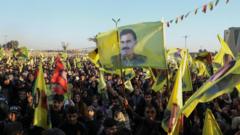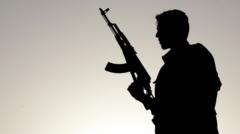The Kurdistan Workers Party (PKK) has made a pivotal announcement to disband, stirring cautious optimism mixed with skepticism among the Kurdish population. Many citizens, while welcoming the possibility of peace, demand assurances and the release of imprisoned Kurdish leaders, reflecting the complex emotions surrounding this historic moment.
A Historic Crossroads: PKK's Disbandment Brings Mixed Reactions from Kurdish Community

A Historic Crossroads: PKK's Disbandment Brings Mixed Reactions from Kurdish Community
As the PKK announces its decision to disband after four decades of conflict, local voices reveal skepticism and a desire for genuine peace.
The Kurdistan Workers Party (PKK), known for its decades-long conflict with the Turkish state, has declared its intention to disband, a move that marks a turning point in Turkey’s complex relationship with its Kurdish minority. This decision comes after a 40-year struggle, characterized by 40,000 deaths and an unresolved quest for a Kurdish homeland. Abdullah Ocalan, the imprisoned PKK leader, has called on the group to disarm, presenting a rare opportunity for peace.
In Diyarbakir, the unofficial Kurdish capital, responses to the announcement exhibit a mix of skepticism and cautious hope. Necmettin Bilmez, a local driver, expressed reservations about the government's intentions, lamenting a history of being "tricked" by officials. In contrast, 80-year-old Mehmet Ek reflected on the importance of ending bloodshed and advocated for the release of jailed Kurdish politicians, suggesting that amnesty for PKK fighters could pave the way for meaningful reconciliation.
The scars of war remain visible in the city, where previous conflicts have left behind rubble and sorrow. Many residents, like Ibrahim Nazlican, highlight that no one has emerged victorious from the decades-long fighting. With memories of bloodshed still fresh, there is a widespread yearning for a more peaceful coexistence between Turks and Kurds.
Calls for the release of Abdullah Ocalan are also prevalent among community members. Advocates argue that his freedom could catalyze a transformative moment for Kurdish rights and self-determination within Turkey. Menice, who lost family members in the conflict, articulated the hope that Ocalan’s release could lead to a brighter future for the Kurdish people.
Despite the challenges, there are signs that both the Turkish government and the PKK may find beneficial grounds to engage in a dialogue for peace. Erdogan's requirement for support from pro-Kurdish political entities in the upcoming elections could create a conducive atmosphere for negotiations. The volatile regional landscape further underscores the urgency for both sides to seek a resolution in this critical juncture of their history.
The people of Diyarbakir, as well as Kurdish communities throughout Turkey, remain poised with a blend of skepticism and guarded optimism. With hopes for a peaceful resolution, many are prepared to engage in dialogue, hoping to end an era characterized by conflict and suffering.






















